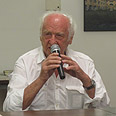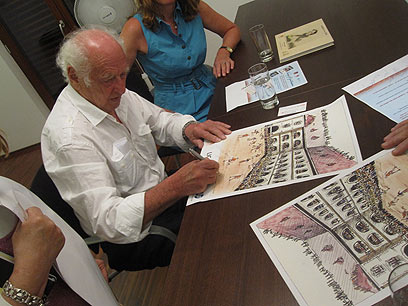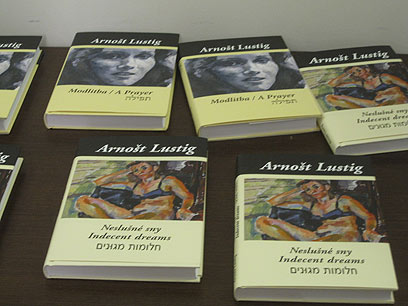
Arnošt Lustig at at the Czech Center in Tel Aviv
צילום: Tamar Zmora
Arnošt Lustig: Jewish experience universal
Renowned Czech author shares stories of Holocaust with people worldwide. In Tel Aviv lecture, he speaks about cathartic power of writing, which he began doing at age of 18 as a way to voice his experiences
When Arnošt Lustig returned home to the Czech Republic in 1945, nobody believed his stories of imprisonment in and escape from Nazi concentration camps. Today, Lustig, now a journalist and novelist, shares stories of the Holocaust with people all over the world.
"Sometimes it is impossible to tell certain things," Lustig said in a lecture at the Czech Center in Tel Aviv on June 24. "Writing is something needed by man to share experiences." Lustig spoke about the cathartic power of writing, which he began doing at the age of 18 as a way to voice his experiences.
In 1942, Lustig was sent to the Theresienstadt concentration camp, from where he was transported to Auschwitz and Buchenwald. He escaped from a train carrying him to Dachau, when the engine was mistakenly destroyed by an American fighter-bomber in 1945.
Upon returning to his home in then Czechoslovakia, he began to tell his story to the community, but it fell on deaf ears. He recounted one of his teachers who patted him on the head and looked at him as if he were a hallucinating lunatic.

'Writing is needed by man to share experiences' (Photo: Tamar Zmora)
In 1948, Lustig came to Israel as a journalist to report on the War of independence for Czech radio station Radio Prague. While in Israel he met his wife, who was volunteering in the Haganah at the time. Soon after, Lustig and his wife returned to Prague, where they lived with their two children until the Soviet-led invasion that ended the Prague Spring (or political liberalization) of Czechoslovakia in 1968.
Lustig and his family found refuge in Italy and Israel briefly, but ultimately immigrated to the United States. Residing in Washington D.C., Lustig was a Professor in the department of literature at American University. After the Velvet Revolution in 1989, which marked the end of Soviet reign in Czechoslovakia, Lustig and his family divided their time between Prague and the United States. He retired from American University in 2003 and now claims permanent residence in his native Prague.
A prolific writer, Lustig has written 14 novels the most renowned "A Prayer for Katerina Horovitzova" (1964), nominated for the national book prize; "Lovely Green Eyes"(2004); "Dita Saxova" (1962); and "Night and Hope" (1957), which have been turned into films.
His books revolve primarily around strong female protagonists offering an intimate perspective of the effects of the Holocaust on an individuals psyche. Lustig's novels have been translated from Czech into English and Hebrew and are distributed worldwide. He was the eighth recipient of the Franz Kafka Prize and has received much international critical acclaim for his realistic portraits and gripping prose.

Lustig's book. Strong female protagonists (Photo: Tamar Zmora)
A large percentage of Lustig's readership is comprised of young people. He believes this stems from their ability to relate to his characters, who are in their teens. Moreover, the question of survival he says is strong in his young audience. Consequently, Lustig prefers to focus on the goodness of people.
"People understand goodness, they do not understand evil, where it comes from and why," he says.
Lustig, like many of his generation, did not tell his children about his past life. His son and daughter did not find out their father was a holocaust survivor until they were teenagers. Recently, his son, Josef, a teacher and filmmaker in the United States, finished a documentary for Czech television about his father's memories of the concentration camps.
"The Jewish experience is universal," Lustig says. He goes on to explain that an author does not have to be Jewish to document the atrocities that befell the Jewish people, noting American novelist William Styron's influential bestseller "Sophie's Choice".
"Styron was not Jewish, yet he wrote of very Jewish experiences," he says. "The Jewish experience is a very human experience. That's why they will write about it for the next 1,000 years."










